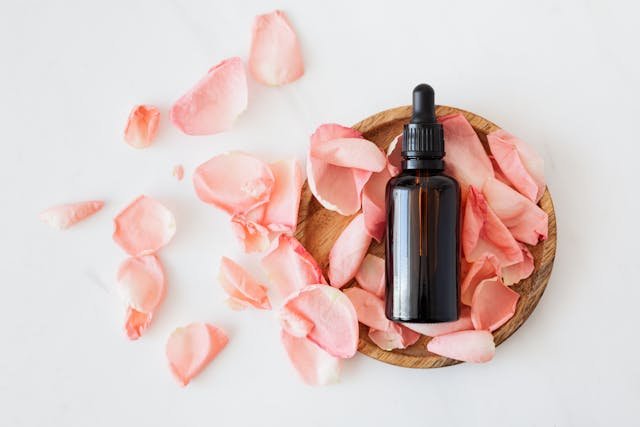In the realm of aromatherapy, few essential oils boast the versatility and efficacy of rosemary oil. Derived from the perennial herb Rosmarinus officinalis, this aromatic oil has been cherished for centuries for its myriad health benefits, particularly in the realms of hair and skincare. In this comprehensive guide, we delve into the fascinating world of rosemary aromatherapy oil, exploring its benefits, applications, and potential side effects.
Understanding Rosemary Essential Oil
Rosemary essential oil is extracted from the leaves of the rosemary plant through a process of steam distillation. This oil is renowned for its robust, herbaceous aroma with hints of woody undertones, making it a popular choice in aromatherapy and perfumery. However, its therapeutic properties extend far beyond its pleasant scent, with numerous studies highlighting its medicinal potential.
Rosemary Essential Oil for Hair
One of the most celebrated uses of rosemary essential oil is for hair care. From ancient civilizations to modern times, rosemary has been revered for its ability to promote hair growth, strengthen hair follicles, and combat various scalp issues.
- Hair Growth Stimulation:
Rosemary oil is rich in antioxidants and anti-inflammatory compounds that can improve circulation to the scalp, thereby promoting hair growth. Its stimulating effect on the scalp encourages hair follicles to remain active, potentially leading to thicker, fuller hair over time. - Scalp Health:
A healthy scalp is crucial for maintaining vibrant, lustrous hair. Rosemary essential oil possesses antimicrobial properties that can help alleviate dandruff, itchiness, and other scalp conditions. Its antifungal properties may also combat conditions like fungal infections, keeping the scalp clean and nourished. - Hair Strength and Shine:
The nutrient-rich composition of rosemary oil, including vitamins A, C, and E, as well as minerals such as iron and calcium, fortifies hair strands from within. Regular use of rosemary oil can enhance hair strength, reduce breakage, and impart a natural shine to dull, lackluster locks.

Rosemary Essential Oil Benefits for Skin
Beyond its hair care prowess, rosemary essential oil offers a plethora of benefits for the skin, thanks to its potent anti-inflammatory, antimicrobial, and antioxidant properties.
- Acne Treatment:
Acne is a common skin concern caused by factors such as excess oil production, inflammation, and bacterial overgrowth. Rosemary essential oil exhibits antimicrobial activity against acne-causing bacteria, while its anti-inflammatory properties help reduce redness and swelling associated with breakouts. Additionally, its astringent properties can help regulate sebum production, preventing clogged pores and future blemishes. - Anti-Aging Effects:
The aging process is characterized by the gradual breakdown of collagen and elastin fibers in the skin, leading to wrinkles, fine lines, and sagging. Rosemary essential oil is rich in antioxidants, such as rosmarinic acid and carnosic acid, which neutralize free radicals and protect the skin from oxidative stress. By reducing oxidative damage, rosemary oil may help preserve skin elasticity, minimize the appearance of wrinkles, and promote a more youthful complexion. - Skin Healing and Repair:
Whether dealing with minor cuts, scrapes, or insect bites, rosemary essential oil can aid in the skin’s healing process. Its antimicrobial properties help prevent infection, while its anti-inflammatory effects soothe irritation and promote tissue regeneration. Incorporating rosemary oil into skincare formulations or using it topically can accelerate wound healing and alleviate discomfort.
Rosemary Essential Oil for Hair: Side Effects and Precautions
While rosemary essential oil offers a myriad of benefits for hair and skin, it’s essential to use it safely to avoid adverse reactions. Some individuals may experience sensitivities or allergic reactions when using essential oils, including rosemary oil. To minimize the risk of adverse effects, consider the following precautions:
- Dilution:
Rosemary essential oil is highly concentrated and potent, so it should always be diluted with a carrier oil, such as coconut oil or jojoba oil, before applying it to the skin or scalp. A recommended dilution ratio is typically 1–3% rosemary oil to carrier oil. - Patch Testing:
Before using rosemary essential oil extensively, perform a patch test by applying a small amount of diluted oil to a small area of skin and monitoring for any adverse reactions, such as redness, itching, or irritation. If irritation occurs, discontinue use immediately. - Avoiding Contact with Eyes and Mucous Membranes:
Essential oils should never be applied directly to the eyes or mucous membranes, as they can cause irritation and discomfort. If accidental contact occurs, rinse thoroughly with water and seek medical attention if irritation persists. - Pregnancy and Medical Conditions:
Individuals who are pregnant, nursing, or have underlying medical conditions should consult with a healthcare professional before using rosemary essential oil, as certain compounds in the oil may interact with medications or exacerbate pre-existing conditions.
Rosemary aromatherapy oil stands as a testament to nature’s healing prowess, offering a wealth of benefits for hair, skin, and overall well-being. Whether used in hair care formulations, skincare routines, or aromatherapy practices, this versatile oil continues to captivate with its aromatic allure and therapeutic potency. By understanding its properties, applications, and precautions, individuals can harness the power of rosemary oil to enhance their health and vitality, one drop at a time.
For more such stories keep visiting Envitality
Leave a Reply